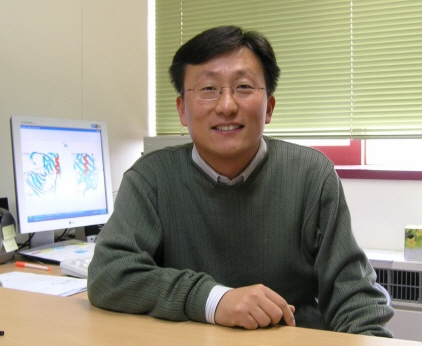Cancer, high blood pressure, and diabetes are not only scary for their low rates of cure, but also for their unwanted complications. Now doctors can predict what kinds of complications a patient could get with a new method, developed by a POSTECH research group.
The research team of Professor Sanguk Kim of the Division of IT Convergence Engineering (ITCE) as well as the Department of Life Science, Solip Park (ITCE), Prof. Sung Key Jang (Life), and Prof. Juyong Park (Kyung Hee University) announced their results in the May issue of the online edition of Molecular Systems Biology. Officially titled, “Protein localization as a principal feature of the etiology and comorbidity of genetic disease,” this research analyzed the occurring pattern of various complications of cancer or diabetes.


‚Ė≤ Professor Sanguk Kim and Solip Park
This work was previously considered impossible because almost all human diseases are caused by the interaction of many genes. Diabetes, especially, comes with a variety of complications so some doctors who have tried to predict disease risk factors were faced with too many possible combinations to consider.
The POSTECH research team first gathered a pool of data from a million patients. They then analyzed the protein expression locations of disease causing genes within a cell and the interactions among them, and succeeded in discovering the occurring pattern of various complications.
Former methods obtained the pattern by simply analyzing the interactions among the genes. However, this new method includes location, in which protein expression takes place, doubling the accuracy of the prediction.
Developing a better prediction method has been the center of attention of etiology because it can minimize the occurrence of complications. Until now, patients with diabetes had to receive an examination at least once a year to check for any complications. Scientists in medical fields in developed nations are focusing on introducing this prediction method to the diagnosis.
“The result of this research holds its meaning in the fact that patients with diseases like cancer or diabetes could predict possible complications and prepare accordingly before actually getting additional diseases,” said Prof. Sanguk Kim. He also added that with “individual differences through genetic analysis of gene location and interactions, this method will be a big help in prevention.”


